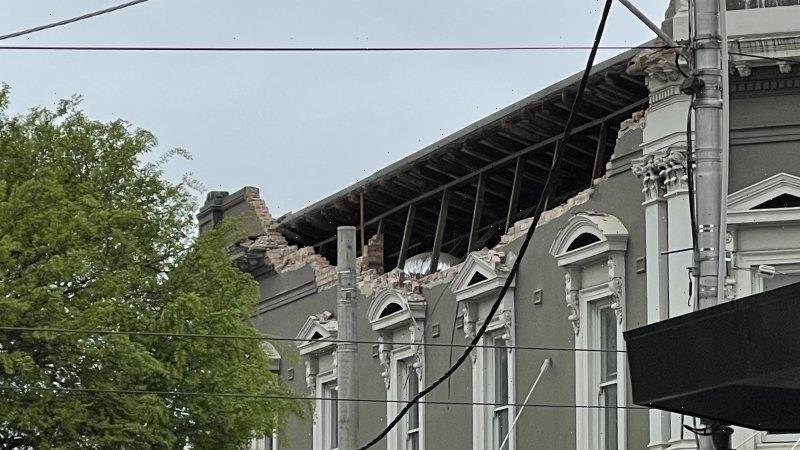Beneath the recent revelations by The Age and disturbing stories coming from the Royal Commission into Aged Care lies an industry largely unregulated and almost totally hidden to most Victorians: the supported residential services.
For more than 40 years, welfare advocates have despaired at the plight of the elderly, frail and disabled residents living in these supported residential services.
Welfare advocates raised concerns about Hambleton House in Albert Park.Credit:Chris Hopkins
While there are no doubt some pension-only supported residential services where residents are well cared for, many live in squalor cut off from all hope of gaining access to the types of services we would normally expect vulnerable people to receive.
Wintringham, which provides aged care services to elderly homeless people, regularly receives referrals from local social workers on behalf of clients that they have rescued from these places. The condition of some of these people is heartbreaking and devastating to our staff.
We see people who have had no protection from ruthless supported residential services proprietors, who have arrived broken and intimidated, frightened and often overly medicated. I remember one elderly woman who arrived fly-blown.
Supported residential services lie outside the Commonwealth aged care program and are not subject to any of its regulations or standards.
Supported residential services lie outside the Commonwealth aged care program and are not subject to any of its regulations or standards.Credit:Jessica Shapiro
The core problem is that a for-profit company that relies solely on a clients’ pension as a source of income will, even with the best intentions, struggle to remain in business let alone provide quality care.
Trained staffing, quality food and the other costs of running a business cannot be covered by a charge on a person’s pension, even if it is 95 per cent as is common practice in supported residential services.
The predictable result is that services in some facilities are so bad it is difficult for people who have never ventured into a supported residential service to imagine.
The industry survives because there are so few supported housing alternatives available. As an example, Wintringham has over 1000 impoverished elderly men and women on our housing and support waiting list.
Surely that is an outrage: a country as wealthy as ours should be able to provide safe and affordable supported housing to elderly people in their final years.
Many of the clients of existing supported residential services are not able to live independently, but they often are not of a level of frailty that they require full Commonwealth-funded residential aged care. They do, however, need care and support.
At the height of the COVID pandemic, Wintringham was asked by the state to rehouse residents of one of the worst of the supported residential services whose residents had become infected with COVID.
Upon their release from hospital and with assistance of workers whom we transferred from our own aged care services, we housed the residents in a temporarily vacated backpackers hotel and found appropriate care and accommodation for all of those elderly people.
The successful outcome of this crisis intervention was not lost on either us or on the department. We demonstrated with practical outcomes that it was possible to provide an alternative to for-profit supported residential services.
It is time for the Andrews government to draw on this experience and to introduce a new program that resources not-for-profit providers to care for the people living in supported residential services.
Importantly, these organisations should be held accountable for any funding they receive. This would be in direct contrast to the current regulations of the supported residential service industry which are totally inadequate.
In response to the COVID pandemic, the state government purchased hotel accommodation for homeless people and then funded their relocation into permanent housing. They have also commenced the $5 billion Big Housing Build for more social housing in Victoria.
In doing so they have demonstrated that they have the appetite to address some of the long-term structural inequalities facing disadvantaged people.
The time is now right for the government to turn its attention to the shameful state of the supported residential service industry.
Bryan Lipmann AM is CEO of Wintringham, the largest provider of aged care services to elderly homeless people in Australia.
Most Viewed in National
From our partners
Source: Read Full Article




